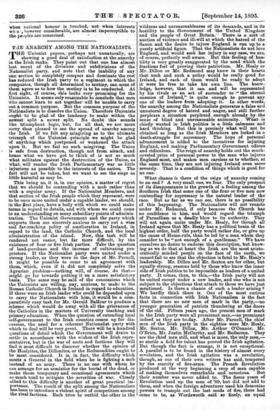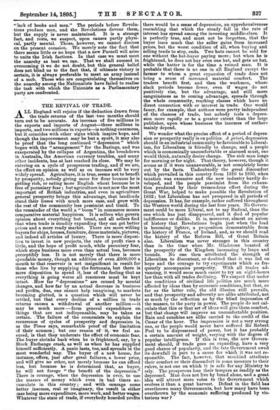TJE ANARCHY AMONG THE NATIONALISTS. T HE Unionist papers, perhaps not
unnaturally, are showing a good deal of satisfaction at the anarchy in the Irish ranks. They point out that one has almost lost count of the divisions and subdivisions of the Nationalist party, and note that the inability of any one. section to completely conquer and dominate the rest has reduced the Irish party to a regiment in which the companies, though all determined to mutiny, can none of them agree as to how the mutiny is to be conducted. At first sight, of course, this -looks very promising for the Unionists. It seems only reasonable to conclude that men who cannot learn to act together will be unable to carry out a common purpose. But the common purpose of the Nationalists is to dissolve the Union. Therefore Unionists ought to be glad of the tendency to make within the newest split a newer split. No doubt this sounds like triumphant logic, but, for all that, we are more sorry than pleased to see the spread of anarchy among the Irish. If we felt any:misgiving as to the ultimate triumph of the Unionist _principle we might be glad of anything which postponed or weakened the attack upon it. But we feel no • such misgiving. The Union is safe from destruction, though not from attack, and hence what we have got to think of is not so much what militates against the destruction of the Union, as what, will render the Irish Parliamentary war as little injurious as possible to the interests of the nation. The fort will not be taken, but we want to see the siege as little harmful as may be.
This being so, it is, in our opinion, a matter of regret that we should be contending with a mob rather than with a regular army. If the Nationalist Members, and that section of the Irish people which they represent, were to be once more united under a capable leader, we should, in the first place, have a body with which we could make terms in regard to details, and with whom we could. come to an understanding on many subsidiary points of adminis- tration. The Unionist Government and the party which supports them are sincerely anxious to carry out a wise and far-reaching policy of amelioration in Ireland, in regard to the land, the Catholic Church, and the local administration of the island. Now, this task will be rendered not easier, but far more difficult, by the existence of four or five Irish parties. Take the question of land-purchase and the increase of cultivating pro- prietors. If the Nationalist party were united under a strong leader, as they were- in the days of Mr. Parnell, it might be possible to come to an agreement with them, which, even if it did not completely solve the Agrarian problem—nothing will, of course, do that— might go far towards putting it on a more satisfactory basis. The same may be said of the concessions which the Unionists are willing, nay, anxious, to make to the Roman Catholic Church in Ireland in regard to education. If there were an Irish leader who could be depended upon to carry the Nationalists with him, it would be a com- paratively easy task for Mr. Gerald Balfour to produce a scheme which would do away with all the grievances of the Catholics in the matters of University teaching and primary education. When the question of extending local self-government to the Irish counties comes up for dis- cussion, the need for a coherent Nationalist party with which to deal will be very great. There will be a hundred questions of detail which the Government will desire to settle in accordance with the wishes of the Irish repre- sentatives, but in the war of sects and factions they will find it most difficult to discover whether the opinion of the Healyites, the Dillonites, or the Redmondites ought to be most considered. It is, in fact, the difficulty which meets a General in the field when he is fighting a mob instead of an army. There is no one with whom he can arrange for an armistice for the burial of the dead, or make those temporary and occasional agreements which so much tend to mitigate the severities of war. Closely allied to this difficulty is another of great practical im- portance. The result of the split among the Nationalists has been to introduce a violent spirit of competition among the rival factions. Each tries to outbid the other in the wildness and unreasonableness of its demands, and in its hostility to the Government of the United Kingdom and the people of Great Britain. There is a sort of auction of violence and ill-will at which the hatred of the Saxon and the desire to injure England is run up to a purely artificial figure. That the Nationalists do not love England, and would seek her injury in any case, we are, of course, perfectly well aware. But this feeling of hos- tility is very greatly exaggerated by the need which the fractions feel of proving their patriotism. Mr. Healy or Mr. Dillon or Mr. Redmond may know in their hearts that such and such a policy would be really good for Ireland, and each of them would be ready to adopt it were he free to take his own line. The know- ledge, however, that it can and will be represented by his rivals as an act of surrender to "the eternal enemies of Ireland," is quite enough to prevent any one of the leaders from adopting it. In other words, the anarchy among the Nationalists generates a false and unnatural degree of hatred and anger, and still further perplexes a situation perplexed enough already by the sense of blind and unreasonable animosity. What is chiefly wanted in Irish politics is a little calmness and hard thinking. But this is precisely what will not be obtained as long as the Irish Members are locked in a death-struggle for supremacy. The hope of personal advancement is added to the incentives for injuring England, and making Parliamentary Government odious and ridiculous. The reign of anarchy holds out the much- coveted prize of personal power to the man who injures England most, and makes men careless as to whether, at the same time, they are not injuring Ireland even more severely. That is a condition of things which is good for no one.
What chance is there of the reign of anarchy coming to an end ? A very small one, we fear. The only prospect of its disappearance is the growth of a feeling among the Southern Irish that some one of the four or five men now contending for supremacy is the natural leader of the race. But as far as we can see, there is no possibility of this happening. The Nationalists will not reunite. under Mr. Redmond, if only because the Church has no confidence in him, and would regard the triumph of Parnellism as a deadly blow to its authority. They will not again unite under Mr. Healy, for though all Ireland agrees that Mr. Healy has a political brain of the highest order, half the party would rather die, or give up the cause of Home-rule, than be led by a man whom they consider to be "not enough of a gentleman." We have ourselves no desire to endorse this description, but know- ing as we do that at heart the Irish are the most aristo- cratically minded people on the face of the earth, we cannot fail to see that the objection is fatal to Mr. Healy's leadership. Mr. Dillon and Mr. Sexton are for other, but equally strong, reasons held by those who know the inner side of Irish politics to be impossible as leaders of a united party. It comes, then, to this,—the Irish party will not be united except under a new leader, and one who is not subject to the objections that attach to those we have just mentioned. Is there a chance of such a leader arising ? We hardly think there is. One of the most curious facts in connection with Irish Nationalism is the fact that there are no new men of mark in the party,—no younger generation of patriots thundering at the doors of the old. Fifteen years ago, the present men of mark in the Irish party were all prominent men,—as prominent indeed as they are to-day. After Mr. Parnell, the chief men of the Irish party in the eighties were Mr. Healy, Mr. Sexton, Mr. Dillon, Mr. Arthur O'Connor, Mr. O'Brien, Mr. Justin McCarthy, and Mr. Redmonn. They are the chief men still, and what is more, the only men,— so sterile a field for talent has proved the Irish agitation. But though the fact is strange, it is not exceptional. A parallel is to be found in the history of almost every revolution, and the Irish agitation was a revolution, though, as one of their own writers has said, tempered by the scarcity of fire-arms. The French Revolution produced at the very beginning a crop of men capable of making themselves remarkable and notorious. But their number was never added to. The fierce years of Revolution used up the men of '89, but did not add to them, and when the foreign adventurer used his demoniao powers to trample out the last seeds of fire, there had come to be, as Wordsworth said so finely, an equal "lack of books and men." The periods before Revolu- tions produce men, and the Revolutions devour them, but the supply is never maintained. It is a strange fact, and rests, we suspect, upon causes partly physi- cal, partly mental. These, however, we cannot discuss on the present occasion. We merely note the fact that there seems little or no hope that a new Parnell will arise to unite the Irish factions. In that case we must meet the anarchy as best we. can. That we shall succeed in overcoming it we do not doubt, but this general belief; does not blind us to the fact that, if ultimate victory is certain, it is always preferable to meet an army instead of a mob. Those who are congratulating themselves on the anarchy among the Nationalists have failed to realise the task with which the Unionists as a Parliamentary party are confronted.



































 Previous page
Previous page